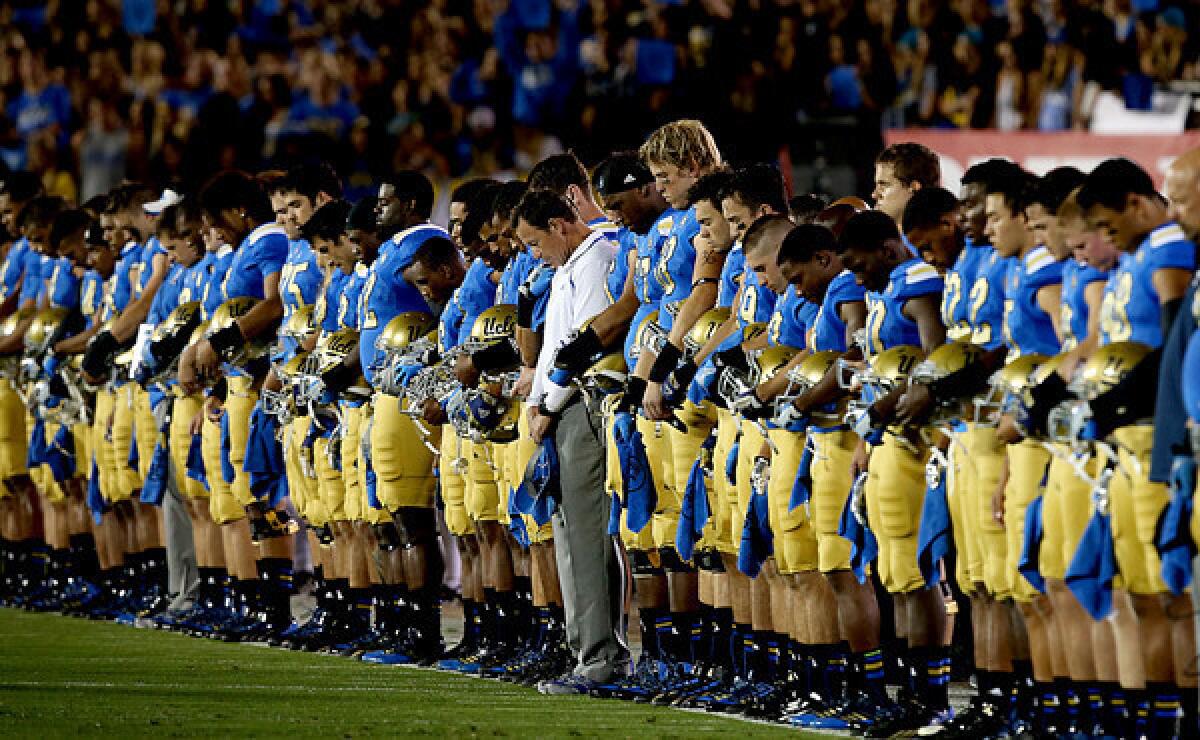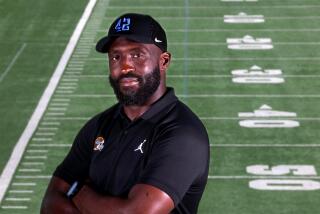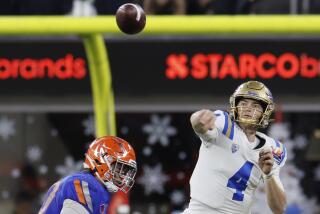Jim Mora’s Bruins keep memory of Nick Pasquale alive

The most important huddle of the UCLA football season occurred long after a game, far from a field, in the center of a storm far greater than sport.
On a Sunday afternoon, Sept. 8, at 2:30 p.m., UCLA’s Jim Mora walked through the front door of the San Clemente home of the grieving family of Bruins receiver Nick Pasquale, who had died just hours earlier when hit by a motorist while walking home from a party.
Mel Pasquale, Nick’s father, remembers the exact time, the exact words, the exact tone of voice.
“Coach Mora called us right after we received the horrible news and said, ‘What is your address, I’m coming down, it’s not up for discussion, I want to help,’” Mel recalled. “Then he walked through the door and said, ‘OK, what can I do?’”
Pasquale wasn’t a star, wasn’t on scholarship and had a career consisting of exactly one play. But in Mora’s view, none of that mattered, because Pasquale was a Bruin.
Mora waded through the media crowd outside the Pasquale home and was ushered inside. He and the Pasquales — Mel, wife Laurie, son A.J. — hugged, wept, reminisced about the tough little walk-on.
Then, in the middle of the huddle, the coach began calling plays.
“He literally coached us up on how to handle this,” Mel said. “He said, ‘Here’s what’s going to happen now. Here’s what the media is going to do. Here’s how you can deal with it.’”
Four months later, on the final day of the season, the huddle remains. This time, Mora connected with the Pasquale family from out of the sky. Before the Sun Bowl game in El Paso, a pregame skydiver fluttered out of the clouds wearing Pasquale’s No. 36.
“I saw it and I was, like, ‘Wow, this just goes beyond anything I could imagine,” Mel said. “It was just one more amazing thing that UCLA and Coach Mora have done to stay part of our lives.”
It was, indeed, the culmination of a unique season’s worth of support that has helped a family begin the process of healing while defining a football program in the process of change.
If you don’t believe Mora has instilled a new football culture stressing passion and togetherness, then you need to listen to the father of the 5-foot-7 kid whose spirit became a giant.
“On that first day he walked through our door, Coach Mora said, ‘My support is not just for now. … This is not going to end,’” Mel recalled. “And he was right. It has not ended.”
From the No. 36 patch on their jerseys to the No. 36 painted into the Rose Bowl field, from their 38 unanswered points against Nebraska in the first game after his death to Mora’s public acknowledgment of his influence during the Sun Bowl trophy presentation, Pasquale’s presence has been the season’s most powerful constant.
“After something like this happens, there’s usually an initial rush of emotion by everyone on the outside, then it goes away,” Mora said. “I wanted to make sure that didn’t happen here. I didn’t want our support to be just a gesture. I wanted it to be real.”
Until the Sun Bowl, a trip they could not make because of a previously planned holiday visit with family out of the country, the Pasquales had attended every UCLA game at home and away. On the road, they often hung out at the team hotel with other members of the Bruins family. Before home games, they were hugged by the players on Bruin Walk. After the games, they would wait outside the locker room with other families and receive more hugs.
“These players became like my sons, so many sons, everyone stopping by and greeting us and asking us how we were doing,” Mel said. “It was as close as I felt to Nick since he was gone.”
Throughout the weeks, the Pasquales would receive calls and texts from players and coaches, especially Mora, who would often phone Mel while he driving home from the field.
“I just feel like, part of our responsibility as human beings is to comfort those who need comforting,” Mora said. “I feel it’s so critically important for our program to be there for their family, to somehow give them some piece of mind.”
In comforting the Pasquales, the Bruins lifted themselves. Throughout the season, Pasquale’s name is listed on the depth chart as a backup to every position on the kickoff team. After every special teams practice, they ended a chant with his name.
His influence even stretched to the field. Just before the first offensive snap against New Mexico State — their first home game after his death — receiver Shaq Evans walked off the field, leaving the Bruins with only 10 players, the empty spot belonging to Pasquale.
“It was overwhelming,” Mel said.
The support did not wane when Orange County authorities announced that Pasquale, 20, was walking home that night with a blood alcohol content of 0.26, more than three times the legal limit for California drivers. The thought was that at least he was smart enough not to endanger anyone else’s life by driving.
“I coached Nick not to drink and drive, and he was walking home, and that’s all I need to say,” Mel said.
The Pasquales sat at Mora’s table during the team banquet last month, and even presented a new special teams award named after their son. Now that the season is over, the connection could continue as son A.J., 23, a college graduate with a degree in business marketing, hopes to land a job in the Bruins athletic department.
“Just because the season ends doesn’t mean our feelings for them end,” Mora said. “When you come here you are part of something special, part of a family, and we will never discard you.”
Mora, who was recently given a hefty contract extension to continue this cultural shift, seems to be heeding his own mantra when he says he is not interested in pursuing openings elsewhere, particularly at Texas.
The Pasquales are believers.
“All these great things that are happening to UCLA on the field, they are not by accident. Coach Mora is building a family here,” Mel said. “Nick will touch those kids forever, and they will forever touch us.”
Twitter: @billplaschke
More to Read
Go beyond the scoreboard
Get the latest on L.A.'s teams in the daily Sports Report newsletter.
You may occasionally receive promotional content from the Los Angeles Times.







